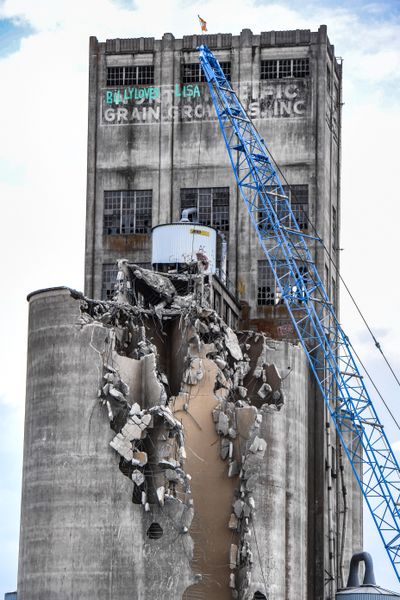Historic grain elevator off Trent Avenue coming down

Billy loves Lisa no more.
The 81-year-old grain elevators on Napa Street just south of Trent Avenue are being demolished, taking with them not only the last vestige of the North Pacific Grain Growers Co. cooperative but the shoddy, if beloved, red graffiti scrawl describing Billy’s feelings toward Lisa.
The fate of this love is unknown, but what happened to the grain growers cooperative is.
It was formed in 1929 in Lewiston, a reaction to the stock market crash that year, which led to a steep dive in agricultural prices, not to mention the Great Depression. As prices dropped, farmers sold their crops at a loss and the Federal Farm Board’s Grain Stabilization Corp. began issuing loans to save farmers from ruin.
In 1930, the cooperative became the North Pacific Grain Growers Co., headquartered in Spokane, and was formed to issue these federal loans that were greater than $3.5 million to local farmers, according to the Manuscripts, Archives and Special Collections department at Washington State University Libraries, which holds upward of 1,000 photographs from the company’s history.
In 1938, the company moved its headquarters to Portland. In Spokane, the company built a grain elevator along the rail tracks near Napa Street, which has stood the test of time – until Brad Smith showed up with his company, Kansas-based Smith Construction Services, which specializes in taking down unused grain elevators.
“Actually, it’s in pretty good shape compared to others we’ve dealt with,” said Smith, who estimated he’s razed at least 20 similar elevators. “These really aren’t cracked that bad. The east bins were put up a lot later and were in much worse condition. We took those down first.”
Though the most obvious structures of the elevator are the tall, cylindrical silos, the elevator refers to the machine that moved grain from ground level into the silos, technology from the 1840s that allowed bulk transport of grain. As any Sunday drive around the Palouse will illustrate, many rural Eastern Washington towns have their own elevators.
So did Spokane, which is part of the problem. Smith said most of the elevators he’s demolished were taken down because of their location.
“A lot of cities grow around them and then they’re stuck. It’s not in a good spot for semitruck traffic,” he said, adding the elevators are also simply outdated. “A lot of these elevators we used to think of as big are small. They don’t have the capacity they need to be a useful facility.”
In 1983, the North Pacific Grain Growers Co. merged with the Farmers Union Grain Terminal Association to become the Harvest States Cooperatives. In 1998, that company merged with Cenex to form CHS Inc., a Minnesota-based large food and energy cooperative.
The vacant facility hasn’t been used in a while but is still owned by Cenex. When demolition is complete, the land will revert to the BNSF railroad and will be used as a storage yard.
Billy, Lisa and the North Pacific Grain Growers Co. grain elevators may be gone, but the east Spokane skyline still has the tall Sperry Flour Mill and the monolithic Centennial Flour Mill. Centennial is on East Trent and Sperry is on East Sprague Avenue and both are owned by agriculture giant Archer Daniels Midland, which uses the Sperry mill as a “mix plant” for dry mixes for donuts, muffins and pancakes, and the Centennial for holding up to 3 million bushels.
They remain. And, thanks to some unknown graffiti artist, Billy’s love for Lisa has temporarily returned, in light blue-green.